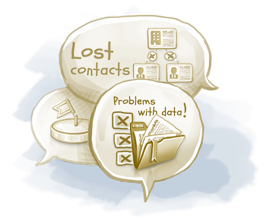Looking for a new CRM system for your company?
Define your terms first!
If you would argue with me, first define your terms!
This famous challenge was first made by French philosopher Voltaire way back in the seventeenth century, yet it finds complete applicability today—especially when it comes to the specification and selection of sales automation tools such as CRM systems.
 What Does It Mean, and to Whom?
What Does It Mean, and to Whom?
Terms such as “usability,” “flexibility,” “options,” and “intuitive” all sound like they belong in a company’s specification for a CRM system, but they very likely mean different things to different groups. For example, IT might define “flexible” as “cross-platform” while a salesperson would understand it to mean “adaptable to our sales process.”
“Useable” to sales management might mean the ability to drill down and view a particular rep’s pipeline while marketing would interpret it as the ability to tightly track promotional responses and lead conversion.
Buzzwords
Adding to the confusion, there is always the latest “required functionality” being bandied about (heavily laden with buzzwords) by technology thought leaders who claim to have their fingers solidly on the pulses of what companies need today. These features are rapidly incorporated into products, while the buzzwords make it into developer press releases and promotional materials.
In turn these features are pitched—still completely intact with buzzwords—to companies seeking CRM systems. In shopping for a solution company stakeholders can be quite overwhelmed with descriptions of functionality “everybody is saying” they need and that they themselves barely comprehend.
Precise Definitions
First, shut out all the noise; in other words, pay attention to what your company stakeholders are saying, not what everyone outside the company—some with financial interests in making their way in—is telling you-you need.
The applicable meanings for all the terms involved come from each individual interested party within the enterprise. Certainly, sales management will have their definition for “intuitive” and salespeople will certainly have another, while company executives will have a third. If all of these are not taken into account and the actual needs of each area clearly worked out, the person charged with acquiring the CRM system is going to apply their definitions.
This approach means that one person or group cannot be solely in charge of choosing the CRM system—input must come from everyone that will be interacting with it. This of course means the sales force, who will be impacted the most by CRM selection and implementation. It means marketing, who will need to track campaign effectiveness and lead quantity and quality. It means sales management who will need the capacity to rapidly and accurately forecast sales, and monitor and improve sales rep performance. It means executives, who will need to rely on accurate sales forecasts to confidently move the company forward.
CRM System Means Cohesive Company Operation
For the most part, this approach to the acquisition of a CRM system is not the one that has been taken in the past—for most companies, it will be new. But for the lack of it companies have been saddled with CRM solutions that were at best partial solutions for some—and much of the time for sales reps no solution at all. The result has been considerable wasted time and effort in trying to make ineffective CRM solutions work, which has been a lot like trying to fit a square peg in a round hole.
An CRM application is chosen with precise input from all concerned departments means a company fully functioning—and automated—as a team, from one end to the other.
So when specifying a CRM system for your company, define your terms!
Once you have defined your terms, you’ll want a CRM solution that meets your definitions. Sign up for one of our free webinars to see what one looks like.




















